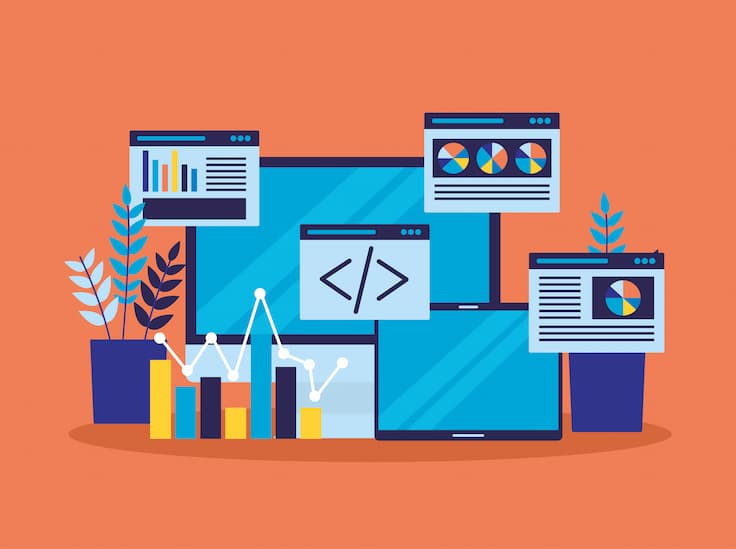From start to the end of the day, we use apps so often that now we can’t live without them. From stopping the alarm in the morning to ending the day by setting the alarm for the next day and everything between. To say apps are now part of our word is under-statement. Apps are changing the way we eat to the way we interact with our homes. So what is the future of app development?
With so much impact on human life, instead of creating the same app for each platform, developers have to come up with a more efficient way. Cross-platform development platforms were the only answer and it is becoming a new standard of creating apps.
Cross-platform development allows coders to create a single code that works on both Android & iOS. The benefit of using cross-platform over native can be summed down to cost savings.
Till now there were two main players in cross-platform platforms race, Flutter & React Native. But with an entry in this race, “Kotlin” is making everyone rethink the future of app development.
No platform is bad or great, there is a target audience for each one. And in this blog, we are going to get which one of Flutter or Kotlin is for you.
Before any comparison, it is important to know what each one represents first. Let’s take a quick look at what Flutter & Kotlin platforms are.
Flutter
Launched in 2015 with a major revamp at end of 2019, Flutter is starting to become go-to cross-platforms development. Flutter is an open-sourced SDK to develop native-like mobile, web, and desktop apps by using a single codebase. Google with it’s revamp made Flutter become a favorite of developers with google insights over technologies. By creating a platform that solves challenges efficiently, flutter is starting to gain popularity.
Brands like eBay, Alibaba, Groupon, Square, and many more used flutter as their default platform for developing apps. One of the core functionality is to be able to bring the security features of websites over other platforms apps.
Kotlin
Kotlin is directly competing with platforms like Java and is getting adopted very quickly as a better alternative. This growth is because of full support from Google, and they also mentioned it to be the preferred platform to develop Android Apps.
Designed by Jetbiens, Kotlin uses Java Virtual Machine with added unique functionality. These unique properties can bring developers a set of new functions, Microsoft Word uses Kotlin.
Kotlin very efficiently annuls programming errors, for this reason, it is the most popular out there. What this very simple written functionality does is, it allows apps developed on Kotlin to run with very few crashes.
The edge that Kotlin provides developers is with it’s “Kotlin Multi Platform” feature. This feature enables Kotlin to compile JVM bytecode, native LLVM code & JavaScript. Along with the development of Android, Web, iOS & desktop, Kotlin in backend works with Java Framework.
Both Flutter and Kotlin have their perfect audience, but this blog is about who is better, so here we go. Kotlin Vs Flutter based on 4 main pillars of app development platforms.
Performance
Flutter provides impressive hot reloading functionality. What does that mean?
Hot reloading functionality makes the developer see the changes done in the backend at the frontend of the app in real-time simultaneously. So with flutter, you can quickly decide on the changes that occurred at the backend to be updated or not.
Kotlin takes the cake by providing performance the same as Native apps.
When it comes to performance and future of app developmentKotlin language helps cross-platform development by its multiplatform compiler that compiles the code with the same format to developer choice of platform form. What it does is, custom and better performance, a performance is like Native apps.
Core Language
In one of our other blogs, we have mentioned Flutter Is The Future Of Mobile App Development because by core it is developed on DART. Google introduced this language, you may have not heard about it, this is because of the rarity of its use. But something not used does not mean it’s not good.
Dart is very easy and simple to understand language. And more in the case of developers who are familiar with JavaScript.
Kotlin is very like Java, as we already mentioned above Kotlin is developed to function with Java at its core. So, just like Flutter, it is a language which very simple and easy to learn if you are already familiar with Java
User Interface
Flutter is based on a widget system, there are multiple widgets provided to the developer and by mixing them she/he creates the apps user interface. It’s perfect in terms of mobile app development
Kotlin does not work with widgets, it has certain instructions which cannot be altered. In flutter you are restricted by widgets, you have to create custom widgets for getting to the level of Kotlin customization. Kotlin gives developers the freedom to create an app interface exactly the way they want to, not restricting it to properties of the widget.
With that level of customization, Kotlin takes the cake when it comes to creating apps that are very unique to the client’s requirement.
Pricing & Test Support
Both Kotlin & Flutter are open source platforms. So in terms of pricing both are equal.
Things are different in terms of testing.
Flutter wins in providing variety here, with its unprecedented testing of widgets written. Kotlin focuses on addressing backend services, Firebase is used for secure backend.
Hot Reload Functionality
Ability to manage front-end simultaneously while working on the back-end is the main reason to consider Flutter.
Low Cost
Free to use, the single codebase that offers native apps like functionality impacts the cost of the development projects.
Customizations
As discussed above, Flutter is a widget-based platform which is perfect for the developer who wants to innovate with their solutions for clients.
King For Developing MVPs
Widgets already present with the ability to develop for both Android & iOS form single codebase is perfect for an MVP project.
App Size
A simple “Hello World” app will take around 6.7 MB of space. The framework involved in Flutter makes the app heavy, compared to other alternatives. Bigger space, lesser the downloads.
Coding Language
Flutter uses DART at its core, a very easy to learn a coding language. But it is very new and has a learning curve to it, which some developers don’t like.
Not A Framework
Yes, Kotlin is not a framework, it’s an SDK. Which for developers means that they don’t have to complete the project to Kotlin. Developers have the option to select which part to migrate and which to stay the same.
Learning Curve
Kotlin is a Java infused platform, it is very easy and does not require any learning curve if a developer is already familiar with Java, Scala, or Swift.
UI Experience
Kotlin does not have widgets for you to work on, which means you are giving control over each pixel with your code. You get full freedom over UI, performance, and even the behavior of the app.
High Development Cost
Earlier we mentioned Kotlin provides very similar functionality like a native app. Kotlin is free to use, but when a platform that brings very similar native app functionality, also brings up the cost of development.
Libraries Are Limited
Kotlin is a great platform, no doubt about it. But it is in the experimental phase right now. Which means libraries to work with are limited right now. But on the horizon, this is going to change with DateTime Library.
Tech Stack Knowledge Is Required
You have to develop API’s, Kotlin does not replace API. What this means for developers is that they must be informed about each platform’s API’s development processes to make it work with Kotlin.
So what is the future of app development? As stated in the beginning both platforms have their target audience, selecting one should be based on the project in hand. If you need MVP to be developed quickly and with minimum cost, we would suggest going with Flutter. If you are looking to control each and individual pixel of the project then Kotlin is a better choice out of two.
Regardless of what you choose both platforms have proved themselves to be reliable and with unique offerings. Both have a great presence in the Android & iOS store.
Going for the platform which seems superior is not the reason for selecting a platform to develop your apps. Looking at the requirements is the key to selecting the platform.
Still, confused and need some more expert advice? Contact Us to get free consultation about your project!













